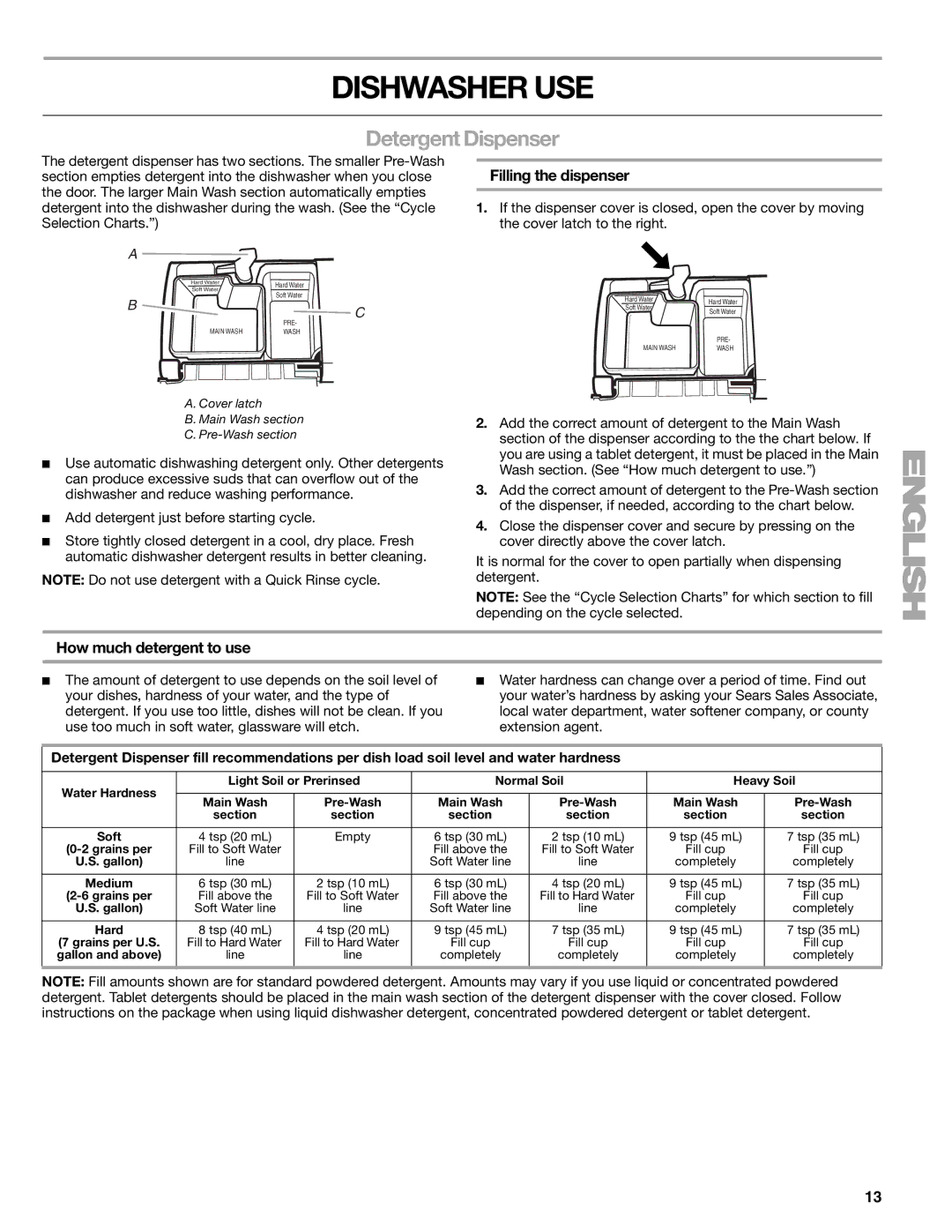
DISHWASHER USE
Detergent Dispenser
The detergent dispenser has two sections. The smaller
A ![]()
Hard Water | Hard Water | |
Soft Water | ||
Soft Water | ||
|
B![]()
![]() C
C
PRE-
MAIN WASH | WASH |
A. Cover latch
B. Main Wash section
C.
■Use automatic dishwashing detergent only. Other detergents can produce excessive suds that can overflow out of the dishwasher and reduce washing performance.
■Add detergent just before starting cycle.
■Store tightly closed detergent in a cool, dry place. Fresh automatic dishwasher detergent results in better cleaning.
NOTE: Do not use detergent with a Quick Rinse cycle.
Filling the dispenser
1.If the dispenser cover is closed, open the cover by moving the cover latch to the right.
Hard Water | Hard Water | |
Soft Water | ||
Soft Water | ||
| ||
| PRE- | |
MAIN WASH | WASH |
2.Add the correct amount of detergent to the Main Wash section of the dispenser according to the the chart below. If you are using a tablet detergent, it must be placed in the Main Wash section. (See “How much detergent to use.”)
3.Add the correct amount of detergent to the
4.Close the dispenser cover and secure by pressing on the cover directly above the cover latch.
It is normal for the cover to open partially when dispensing detergent.
NOTE: See the “Cycle Selection Charts” for which section to fill depending on the cycle selected.
How much detergent to use
■The amount of detergent to use depends on the soil level of your dishes, hardness of your water, and the type of detergent. If you use too little, dishes will not be clean. If you use too much in soft water, glassware will etch.
■Water hardness can change over a period of time. Find out your water’s hardness by asking your Sears Sales Associate, local water department, water softener company, or county extension agent.
Detergent Dispenser fill recommendations per dish load soil level and water hardness
Water Hardness | Light Soil or Prerinsed | Normal Soil | Heavy Soil | ||||
|
|
|
|
|
| ||
Main Wash | Main Wash | Main Wash | |||||
| |||||||
| section | section | section | section | section | section | |
|
|
|
|
|
|
| |
Soft | 4 tsp (20 mL) | Empty | 6 tsp (30 mL) | 2 tsp (10 mL) | 9 tsp (45 mL) | 7 tsp (35 mL) | |
Fill to Soft Water |
| Fill above the | Fill to Soft Water | Fill cup | Fill cup | ||
U.S. gallon) | line |
| Soft Water line | line | completely | completely | |
|
|
|
|
|
|
| |
Medium | 6 tsp (30 mL) | 2 tsp (10 mL) | 6 tsp (30 mL) | 4 tsp (20 mL) | 9 tsp (45 mL) | 7 tsp (35 mL) | |
Fill above the | Fill to Soft Water | Fill above the | Fill to Hard Water | Fill cup | Fill cup | ||
U.S. gallon) | Soft Water line | line | Soft Water line | line | completely | completely | |
|
|
|
|
|
|
| |
Hard | 8 tsp (40 mL) | 4 tsp (20 mL) | 9 tsp (45 mL) | 7 tsp (35 mL) | 9 tsp (45 mL) | 7 tsp (35 mL) | |
(7 grains per U.S. | Fill to Hard Water | Fill to Hard Water | Fill cup | Fill cup | Fill cup | Fill cup | |
gallon and above) | line | line | completely | completely | completely | completely | |
|
|
|
|
|
|
| |
NOTE: Fill amounts shown are for standard powdered detergent. Amounts may vary if you use liquid or concentrated powdered detergent. Tablet detergents should be placed in the main wash section of the detergent dispenser with the cover closed. Follow instructions on the package when using liquid dishwasher detergent, concentrated powdered detergent or tablet detergent.
13
